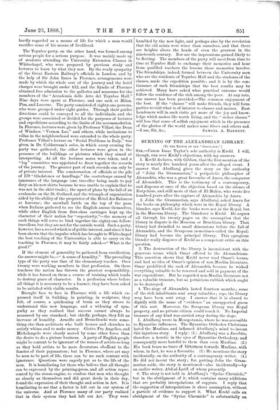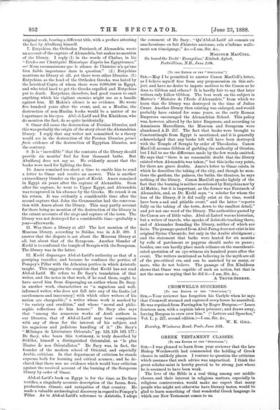BURNING OF THE ALEXANDRIAN LIBRARY.
[TO THE EDITOR OF THE "SPECTATOR.]
SIR,—Canon Isaac Taylor's sole authority is Kral. I will, though, run over Krehrs objections, with my answers.
1. Krehl declares, with Gibbon, that the first mention of the story is nearly five hundred years after the alleged event. I answer that Abulfaraj gives the story on the authority of "John the Grammarian," a peripatetic philosopher of Alexandria, who was a great favourite of Amru, the conqueror of Alexandria. This is the testimony of a contemporary, and disposes at once of the objection based on the silence of Eutychius, and still more of that of El Makin, who wrote five hundred years after the capture of Alexandria by Amru.
2. John the Grammarian, says Abulfaraj, asked Amru for the books on philosophy which were in the Royal library. A blunder, says Krehl, for the books were not in the Royal, but in the Museum library. The blunderer is Krehl. He argues all through his twenty pages on the assumption that the library in dispute is the Museum or Brachium library. That library had dwindled to small dimensions before the fall of Alexandria, and the Serapeum (sometimes called the Royal) library had become the principal library. This egregious blunder really disposes of Krehl as a competent critic on this question.
3. The destruction of the library is inconsistent with the generous terms which Omar offered to the Alexandrians. This assertion shows that Krehl never read Omar's terms, and had no idea of Omar's opinion of non-Muslim literature. Omar prohibited the sack of Alexandria because he wished everything valuable to be reserved and sold in payment of the war expenditure. But he regarded non-Muslim literature not as a valuable treasure, but as pernicious rubbish which ought to be destroyed.
4. The siege of Alexandria lasted fourteen months ; some of the rich inhabitants sent away valuables ; ergo, the library may have been sent away. I answer that it is absurd to dignify with the name of " evidence " an unsupported guess of this sort. Moreover, the Serapeum library was Royal property, and no private citizen could touch it. No Imperial treasure of any kind was carried away during the siege.
5. Abulfaraj wrote in Mesopotamia, where he was accessible to Byzantine influences. The Byzantine Orthodox Christians hated the Muslims, and inflamed Abulfaraj's mind to invent this injurious story. I reply: (1.) Abulfaraj was a Jacobite, therefore a heretic in the eyes of Byzantine Orthodoxy, and consequently more hateful to them than even Muslims. (2.) His book bears no true of bitternese towards Muslims, with whom, in fact, he was a favourite. (3.) He mentions the story incidentally, on the authority of a contemporary writer. (4.) He did not invent the story ; for, putting John the Gram- marian aside, the story is mentioned—also incidentally—by an earlier writer, Abd-al-Latif, of whom presently.
6. The story is not told in Abulfaraj's "Syriac Chronicle," but in the abridgment of it, which contains many additions that are probably interpolations of copyists. I reply that the suggestion of interpolations is sheer assumption, without a particle of evidence to support it. What Krehl calls an abridgment of the "Syriac Chronicle" is substantially an
original work, bearing a different title, with a preface attesting the fact by Abulfaraj himself.
7. Eutychius, the Orthodox Patriarch of _Mersa.: dria, wrote -an account of the capture of Alexandria, but makes no mention of the library. I reply (1) in the words of Chabas, in his "Etudes sur l'Antiquite Historique d'apres lea Egyptiennes," —" Nous reconnaissons que le silence de l'histoire n'a qu'une bien faible importance dans la question." (2.) Eutychius mentions no library at all, yet there were other libraries. (3.) DIV-chills, as the head of the Orthodox Greeks, was hated by the heretical Copts, of whom there were 6,000,000 in Egypt, and who tried hard to get the Greeks expelled and Eutychius put to death. Eutychius, therefore had good reason to omit anything which his vigilant enemies might use as a handle against him. El Makin's silence is no evidence. He wrote five hundred years after the event, and, as a Muslim, the destruction of non-Muslim books would be a matter of no i nportance in his eyes. Abd-al-Latif and Ibn Khaldoun, who do mention the fact, do so quite incidentally.
8. Omar did cause the destruction of Persian libraries, and this was probably the origin of the story about the Alexandrian. library. I reply that any writer not committed to a theory would see in the destruction of the Persian libraries primci fade evidence of the destruction of Egyptian libraries, not the contrary.
9. It is " incredible " that the contents of the library should provide six months' fuel for four thousand baths. But Abulfaraj does not say so. He evidently meant that the books were used for lighting the fires.
10. Arnru remained too short a time to enable him to send a letter to Omar and receive an answer, This is another extraordinary blunder on the part of Krehl. Aram remained in Egypt six years after the capture of Alexandria. Soon after the capture, he went to Upper Egypt, and Alexandria was recaptured in his absence by the Greeks. He retook it on his return. It was evidently a considerable time after the second capture that John the Grammarian had the conversa- tion with Amru about the library. This may partly account for there being no mention of the destruction of the library in the extant accounts of the siege and capture of the town. The library was not destroyed for a considerable time—probably a year—afterwards.
11. Was there a library at all? The last mention of the Museum library, according to Suidas, was in A.D. 390. I answer that the dispute is cot about the Museum library at all, but about that of the Serapeum. Another blunder of Krehl is to confound the temple of Serapis with the Serapeum. The library was in the latter.
12. Krehl disparages Abd-al-Latif's authority as that of a gossiping traveller, and because he confuses the portico of Pompey's Pillar with the Athenian portico in which Aristotle taught. This suggests the suspicion that Krehl has not read Abd-al-Latif. He refers to De Sacy's translation of that writer, and the notes in that work, if he read them, ought to have saved him from disparaging an author whom De Sacy, in another work, characterises as "a sagacious and well- informed writer, who does not fall into any of the faults [of carelessness and inaccuracy] with which other writers of his nation are chargeable ;" a writer whose work is marked by "its variety and erudition," and whose "moral and philo- sophic reflections do him honour." Be Sacy also says that "among the numerous works of Arab authors in our libraries, that of Abd-al-Latif may bear comparison with any of them for the interest of his subject, and his sagacious and judicious handling of it." (De Sacy's "Mélanges de Litterature Orientale," pp. 123, 129, 163, 177.) De Sacy, who bears this testimony, is truly described by Sedillot, himself a distinguished Orientalist, as "le plus inustre de nos Orientalistes." Be Sacy was, in fact, the founder of the modern school of Oriental, and especially Arabic, criticism. In that department of criticism he stands supreme both for learning and critical acumen; and he de- clared that there was no evidence which would bear criticism against the received account of the burning of the Serapeum library by order of Omar.
Abd-al-Latif's book on Egypt is for the time, as Be Sacy testifies, a singularly accurate description of the fauna, flora, productions, climate, and antiquities of that country. He made a valuable archa3ological discovery in regard to Pompey's Pillar. As to Abd-al-Latif's reference to Aristotle, I adopt the comment of De Sacy: " Qu'Abd-al-Latif alt commis um anachronisme en fait d'histoire ancienne, cela n'infirme nulle- meat son temoignage," &c.—I am, Sir, &c., MiLeoraa MileCoLL.
On board the Yacht 'Evangeline,' frinloch. Aylort, Fort william, N.B., June 15th.







































 Previous page
Previous page